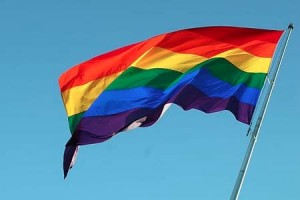“Gay Sin” Survey Reveals We’re Playing God
 I’m always on the hunt for positive news, there being such consistent media focus on the bad stuff. Most days, headlines essentially read, “Handbasket full; hell in sight.”
I’m always on the hunt for positive news, there being such consistent media focus on the bad stuff. Most days, headlines essentially read, “Handbasket full; hell in sight.”
So a recent headline caught my eye because of its positive tone: “Survey: Big drop in those who say being gay’s a sin.” According to Lifeway Research, a division of Lifeway Christian Resources of the Southern Baptist Convention, significantly fewer Americans defined homosexual behavior as sinful in 2012 than in 2011.
As reported at lifeway.com:
“A November 2012 survey of adults in the United States found 37 percent affirm a belief that homosexual behavior is a sin — a statistically significant change from a September 2011 Lifeway Research survey asking the same question. At that time, 44 percent answered, ‘Yes.’”
In contrast, the percentage of Americans who do not believe homosexuality is a sin barely changed over the same period — 43 percent in September 2011 and 45 percent in November 2012. Those unsure of what they believe jumped from 4 percent to seventeen percent.
Ed Stetzer, president of Lifeway Research, attributed this change in large measure to President Obama’s “evolution” on gay marriage in the year preceding his re-election.
“The president’s evolution on homosexuality probably impacted the evolution of cultural values — there is a real and substantive shift, surprisingly large for a one-year time frame,” Mr. Stetzer said.
Proving, if nothing else, that a statistically significant number of Americans may, in fact, believe Mr. Obama is the messiah.
Joking.
Proving that Americans don’t know what sin is and think the concept is fluid, or defined by their personal comfort with certain behaviors, or negotiable because their cousin is gay and he’s a great guy and his partner is super nice so it can’t possibly be sinful or wrong to be gay.
And therein lies the problem with the “gay sin” survey or any survey that measures what we believe about sin.
In fact, Lifeway’s survey may tell us more about our nation’s understanding of morality than it does about our cultural evolution on homosexuality. If sins can now be defined and redefined based on society’s current opinion, then moral relativism has certainly become our new norm.
And a dangerous one, according to Rev. Charles Irvin, senior priest of the diocese of Lansing, Mich., and the founding editor of Faith Magazine, the largest and fastest growing Catholic publication in America, because it means as a society, we’re comfortable playing God and deciding our own moral imperatives.
“What we see is the manifestation of the Imperial Self,” Father Irvin says. “Essentially, this survey reveals that people think, ‘I decide what is real and what is not, what is right and what is wrong, what is true and what is not.’”
If Americans clearly have become more comfortable with homosexuality, it’s not because homosexual behavior is any less sinful than it ever was, but rather our culture has promoted it as natural and therefore acceptable.
As with all surveys, the wording makes a difference in the result. If I had participated and been asked if it’s a sin to be gay, I would also have said no. Being gay is no more sinful than being straight; it’s sex outside of God’s definition of marriage that matters.
Father Irvin summarizes the crux of the question: “The issue over gay marriage does not deal with who is a good person or who is bad, it is rather a question of what is good behavior and what is bad behavior, not simply for the actors themselves but for society as a whole. Redefining sin according to our desires will never benefit society.”

